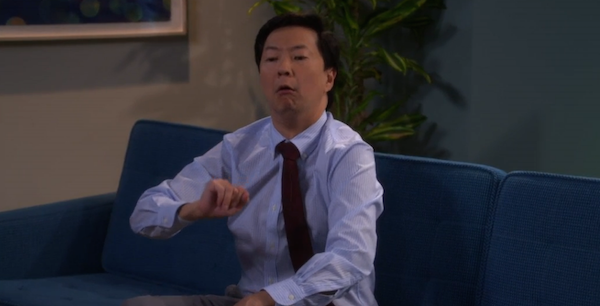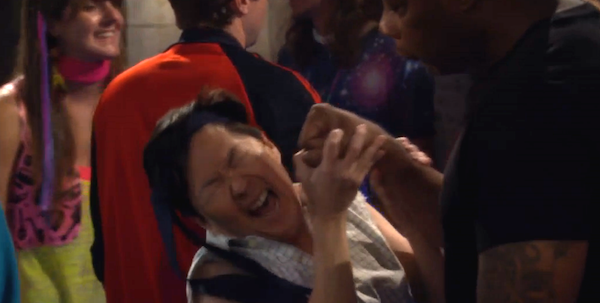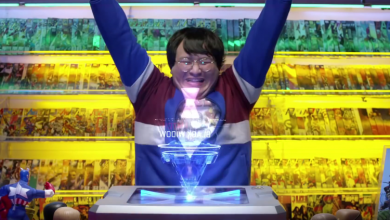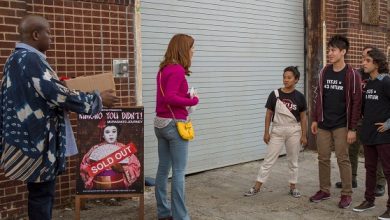Dr. Ken is a Step Backwards for Asian-Americans

This will be the start of an ongoing Kulture investigation into Dr. Ken. We believe this show is a Trojan Horse- on the surface it seems to better the representation of Asian-Americans on American TV. Once you look beyond the surface, what you find is that Ken Jeong again is winning fame and fortune in exchange for damaging the perception of Asians. We are taking a stand against ABC and Ken Jeong.
The premiere of Dr. Ken was announced as a positive development for Asian-Americans in that it’s a new show that puts an Asian-American man and his family front and center. However, rather than bolster the image of Asian-Americans, Ken Jeong reinforces one negative stereotype of Asian-Americans after another. Representation alone is not the goal; if it’s negative, it means that Asian-Americans are worse off than had the show not been televised at all.
Dr. Ken is the Asian buffoon that many white Americans want to laugh at. And they do. Over and over and over again. Rather than offering a comedy where the Asian lead is getting the audience to laugh from his wit; Dr. Ken is the butt of almost every joke- causing the audience to laugh AT him. If you’re an Asian American man with pride, an Asian woman who values the Asian men in her life, or anyone who knows how Asian men have been vilified constantly in Hollywood, you wince at every cringeworthy scene of Jeong being belittled, acting effeminate, and behaving like an immature child.
The following is simply a review of Episode 1. We will review future episodes as well.
After Dr. Ken has an uncomfortable exchange with one of his patients, he goes in for couch time. The scene has Dr. Ken laying down on a psychiatrist’s’ couch (his psychiatrist is his wife). He calls his patients “whiny, complaining bitches” as he writhes like a child.

The line he uses is clearly a reference to himself; he ends by saying “do you know what I mean?” and his psychiatrist wife responds “I know exactly what you mean”. He says these lines in a “valley girl” accent. He seems anything but masculine. He is an object of pity and ridicule.
Later, Dr. Ken resentfully claims his daughter is more popular than he was. An odd preoccupation for a grown man. The scene that is most troublesome is when Jeong mocks the Asian accent. After his wife says he’s just like his father, he responds by saying he sounds nothing like his father. Then he acts out his father speaking, striking an overly serious face and posture. He then says Asian gibberish in a mocking voice.


The audience roars its laughter in approval of Jeong mocking the language of his own. He plays the stereotype for laughs. This is not the leading man we need.
In the show, white cast members such as his nurse seem normal and Asian Dr Ken seems insane.
Dr. Ken talks about concerns about his daughter and his wife dismisses them. Then when Dr Ken counsels his son not to do a mime act because it will harm his reputation, his wife overrules him. A review of Kulture will show that Hollywood routinely pits Asian men against Asian women, and often shows Asian women trampling over Asian men (or vice-versa), as part of a routine divide and conquer method. Later his wife tells him “Can you be quiet?”. His daughter ignores him and clearly has no respect for him either. Jeong is pushed around by his colleagues as well as family members.
There is an odd scene where a black nurse played by Tisha Campbell-Martin requests a “diversity brunch”. This is rejected by the white manager. It gives the impression that minorities make special requests from the company.
Later, Dr. Ken runs into his white boss. His boss criticizes him for the confrontation he had earlier with his patient. The manager tells Dr. Ken to apologize. If he doesn’t, the boss says he will have cause to “finally fire your tiny Asian ass”.

He is clearly mocking the smaller stature of the Asian man – a common way the culture depicts Asian men as weaker and “less-than-men”. Dr. Ken says nothing in return.
Along the way, Dr. Ken is depicted as a buffoon. He says rap lines in a silly voice looking ridiculous and causing the audience to laugh AT him. Again, he is not making the audience laugh with him or showing command and composure via amused mastery. He is not making clever and humorous observations. Dr. Ken is a modern day Asian minstrel show.
When Dr. Ken tries to find his daughter at a rave, he is stopped by a bouncer. The bouncer says he injured his hand when he earlier punched someone. Dr. Ken tries to teach him how to throw a punch; to demonstrate he brings the bouncer’s hand to his face. Dr. Ken then emits a high-pitch squeal.

To the extent that Americans don’t view Asian men as fully men, it’s hardly a wonder when clowns like Ken Jeong depict Asian men the way he does.
Ken Jeong is shoring up the model minority stereotype. Asian men may earn money but they are effeminate, uncool, they are good for little else but their paycheck. Dr. Ken is a walking stereotype.
In Friends and Seinfeld, white characters made witty remarks that made the audience laugh with their observational comedy. Occasionally they were the butt of jokes. However in Dr. Ken, seemingly the only comedy is Ken Jeong making Asians seem ridiculous.
To come full circle, the very opening scene of Dr. Ken-Episode 1 has Ken Jeong’s head up a white man’s ass. Given of what we know Jeong has done for the image of Asian-Americans, especially his portrayal of Mr. Chow in the Hangover series, there may be no scene that better encapsulates Ken Jeong’s acting career than this one.

In the scene Dr. Ken is reviewing a patient’s hemorrhoids. He slaps the man in the ass to conclude his review. Jeong is a ridiculous character whose behavior is laughable but not due to wit or keen observation.
Jeong the laughinstock acts as a vehicle through which others can laugh AT Asian-Americans. With friends like Jeong and ABC, we don’t need enemies.
-
OFFENDER: ABC
CATEGORY OF OFFENSE: Denigration ( Asians are weak)
MEDIA TYPE: TV Show
OFFENSE DATE: October 5, 2015





